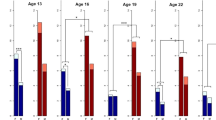Abstract
Subjects with gender-ambiguous names or nicknames (i.e., names that can belong to either males or females) were compared on Bem's androgyny scale to subjects having common or uncommon first names or nicknames to determine if name ambiguity was related to sex-role identification. The results showed that for our sample of college undergraduates (N=489), both males (N=246) and females (N=243) with ambiguous nicknames (e.g., Pat, Tony, Marty) were more often classified as androgynous on the Bem inventory than were subjects with uncommon, common, or no nicknames. Ambiguous first names were unrelated to the androgyny scale. Name and nickname ambiguity were not related to liking of name, self-concept, family tradition, social class differences, or grade point average.
Similar content being viewed by others
References
Allen, L., Brown, V., Dickinson, L., & Pratt, K. C. The relation of first name preferences to their frequency in the culture. Journal of Social Psychology, 1941, 14, 279–293.
Bem, S. The measurement of psychological androgyny. Journal of Consulting and Clinical Psychology, 1974, 42, 155–162.
Bem, S. Beyond androgyny: Some presumptuous prescriptions for a liberated sexual identity. In J. Sherman & F. Denmark (Eds.), The future of women: Issues in psychology. New York: Psychological Dimensions, 1976.
Bem, S. On the utility of alternative procedures for assessing psychological androgyny. Journal of Consulting and Clinical Psychology, 1977, 45, 196–205.
Brender, M. Some hypotheses about the psychodynamic significance of infant name selection. Names, 1963, 11, 1–9.
Brown, M. B. Multiway frequency tables: The log linear model. In M. B. Brown (Ed.), Biomedical computer programs P-Series. Berkeley: University of California Press, 1977.
Constantinople, A. Masculinity-femininity: An exception to a famous dictum? Psychological Bulletin, 1973, 80, 389–407.
Darden, D. K., & Robinson, I. E. Multidimensional Scaling of men's first names: A sociolinguistic approach. Sociometry, 1976, 39, 422–431.
Ellis, A., & Beechley, R. Emotional disturbance in children with peculiar given names. Journal of Genetic Psychology, 1954, 85, 337–339.
Harari, H., & McDavid, J. W. Name stereotypes and teachers' expectations. Journal of Educational Psychology, 1973, 65, 222–225.
Harré, R. Living up to a name. In R. Harré (Ed.), Personality. Oxford: Blackwell, 1976. Chap. 3.
Houston, T. J., & Sumner, F. C. Measurement of neurotic tendency in women with uncommon given names. Journal of Genetic Psychology, 1948, 39, 289–292.
Lawson, E. D. Semantic differential analysis of men's first names. Journal of Psychology, 1971, 78, 229–240.
McDavid, J. W., & Harari, H. Stereotyping of names and popularity in grade-school children. Child Development, 1966, 37, 453–459.
Osgood, C. E., Suci, G., & Tannenbaum, P. The Measurement of meaning. Urbana: University of Illinois Press, 1957.
Savage, B. M., & Wells, F. L. A note on singularity in given names. Journal of Social Psychology, 1948, 27, 271–272.
Spence, J. T., Helmreich, R., & Stapp, J. Ratings of self and peers on sex role attributes and their relation to self esteem and conceptions of masculinity and femininity. Journal of Personality and Social Psychology, 1975, 32, 29–39.
Strunk, O. Attitudes toward one's name and one's self. Journal of Individual Psychology, 1958, 14, 54–67.
Thorndike, E. L. Teachers Word Book of 20,000 Words. New York: Columbia University, Teachers College, 1932. P. 182.
Worell, J. Sex roles and psychological well-being: Perspectives on methodology. Journal of Consulting and Clinical Psychology, 1978, 46, 777–791.
Author information
Authors and Affiliations
Rights and permissions
About this article
Cite this article
Rickel, A.U., Anderson, L.R. Name ambiguity and androgyny. Sex Roles 7, 1057–1066 (1981). https://doi.org/10.1007/BF00288506
Issue Date:
DOI: https://doi.org/10.1007/BF00288506




